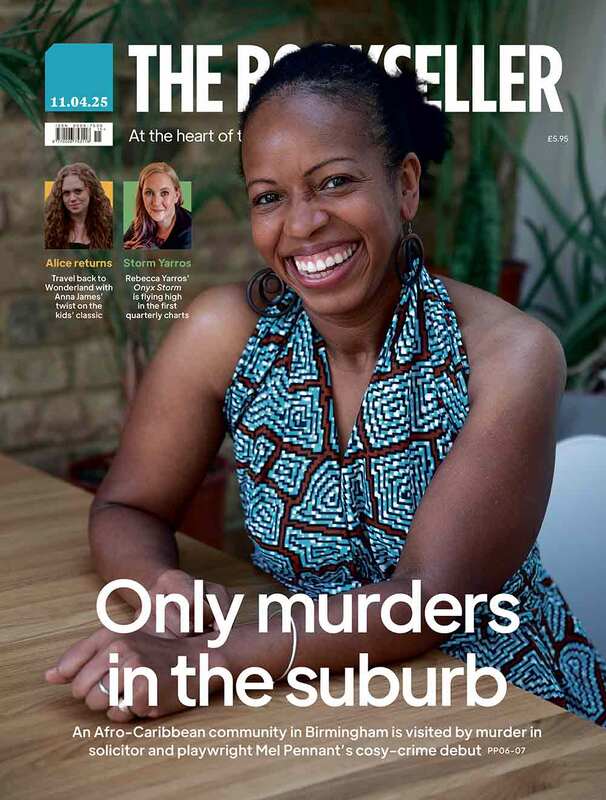You are viewing your 1 free article this month. Login to read more articles.
Audio, AI and audiences key for 2018
Book industry leaders are divided in terms of their outlook for 2018, with some optimistic about growth and others more cautious about the delicate state of high street retailing and the impact of continued political instability.
Opportunities will come in the form of international growth, particularly in China and the Far East, according to Penguin Random House UK’s chief executive Tom Weldon, driven by the weaker pound. Publishers will find fresh audiences as a new generation of readers is ushered in, said Faber c.e.o. Stephen Page, while several chiefs have predicted continued growth in audiobook sales.
Publishers will get even closer to their audiences, believes Pan Macmillan m.d. Anthony Forbes Watson, and this will be aided by recent developments in artificial intelligence, thinks Hachette UK’s new c.e.o. David Shelley.
As for political instability, leaders are split as to whether the turbulence of last year will continue into 2018. Some, such as HarperCollins UK’s chief executive Charlie Redmayne, believe things could get more choppy as inflation and higher interest rates start to bite, while Profile Books managing director Andrew Franklin fears for the industry should the UK exit the European Union without a trade deal. But others are less concerned, sure the ride will become calmer a second year on from the EU membership referendum.
What unites many chief executives, though, is their concern for high street retail, with the sale of Waterstones, a vital bricks-and-mortar retailer for the sector, looming. The “biggest” long-term risk to UK publishing is the reduction in physical space dedicated to publishing, says DK c.e.o. Ian Hudson; he said publishers should “redouble” their efforts to support high-street booksellers in order to prevent this.
In terms of trends, sales of beautiful illustrated books are tipped to grow, and in children’s, “Mermicorn” publishing—a hybrid of a mermaid and unicorn—could be big, according to Hachette Children’s Group c.e.o. Hilary Murray Hill. For Curtis Brown joint-c.e.o. Jonny Geller, “non-fiction dropped considerably in 2017 and this needs to be addressed”, but Shelley believes “in fiction, the market for psychological thrillers featuring unreliable narrators will become even more saturated”.
Tom Weldon
Penguin Random House UK, chief executive
We will maximise the discovery and selling of books online, getting ever closer to existing and new customers and consumers, and further enhancing the distinctiveness of our publishing houses. We will also look to develop new growth areas like audio, education, China, children’s IP, and our live-event business.
And finally, we want to use the scale and reach of our publishing, and the trust and integrity of our brand, to play a meaningful role in society and to use our voice to positive effect.
Charlie Redmayne
HarperCollins UK, chief executive
It is possible that we will face macroeconomic challenges in 2018, with rising inflation and interest rates potentially creating a recessionary environment. The physical books market is in a steady state, with Amazon and Waterstones growing share. But the e-book market will continue to contract, both in terms of [overall] e-book sales and traditional publishers’ e-book business, as Amazon continues to put more emphasis on its own publishing. Meanwhile, the audio business will continue to go from strength to strength, with new customers coming to the format and new, original content coming into the market.
Hilary Murray Hill
Hachette Children’s Group, c.e.o.
I am feeling optimistic about the year ahead. The children’s market is in a pretty healthy state. I think the big authors and brands will continue to dominate [Nielsen’s] Total Consumer Market in 2018, but I am heartened to see other books breaking into the top 10. Children need variety: they can’t exist on a diet of just two or three household-name authors.
For as long as I can remember, the publishing industry has been worried about the high street, but bookshops are still there—and some are in profit for the first time in years.
I think funny books will continue to triumph, and magical fantasy seems to have been extremely popular this autumn—I’m sure it will grow even further in 2018.
If I had to predict a trend for 2018, I wouldn’t be surprised to see some “Mermicorn” publishing [a unicorn that has a mermaid tail and gills so that it can live underwater].
Ian Chapman
S&S UK, chief executive and publisher
I remain optimistic about the future and about 2018. Bookselling, in its various forms, will continue to prevail when accompanied with the expertise and dedication that is so apparent across all channels. The high street, of course, remains under pressure. There are many demands on people’s time: a range of new media; financial worries; politics; Brexit-type concern; the wider global fluctuations as the US, Russia and China jostle for attention; the continued onslaught of other media, from social to the more traditional forms of entertainment.
But with the opportunities afforded to books and those who write them, there is much to excite. Content is king, certainly. And we, as an industry, are great and proud providers.
Jonny Geller
Curtis Brown, joint-c.e.o.
I am always optimistic, otherwise I wouldn’t be an agent. Publishers tend to be pessimistic, but I’m yet to meet a poor publisher.
As ever, the health of the high street booksellers will be uppermost in publishers’ minds in 2018. It’s always precarious, but this year certain shadows hang over certain retailers. If a Waterstones sale occurs, it will result in a seismic change to the publishing landscape. I can also see one big publisher up for sale this year too.
There is also the perennial challenge of competing with long-form television and social media. Publishers will have to spend more on attracting wavering customers and make new arguments on behalf of their authors to compel buyers into bookshops.
In terms of challenges, non-fiction dropped considerably in 2017 and this needs to be addressed. Literary fiction is in trouble and needs more support from every level of the publishing chain. Pricing will still be key and pressure to keep it low will put pressure on bottom lines. However, books should be cheap. We just need to sell more of them.
Stephen Lotinga
Publishers Association, chief executive
The economic outlook will be better than most people fear. ever since the EU referendum, predictions have been made that the economy will crash. It hasn’t, and despite sluggish growth, it continues to confound expectations by being much more resilient than many feared. Publishing in the UK will continue to grow, with potential light at the end of the Brexit tunnel if the government can make further progress on trade talks.
Creativity will flourish. one of the upsides of periods of uncertainty is that they provide fertile ground for the most imaginative and creative minds. As long as publishers are able to continue investing in and supporting the best talent, then authors will continue to provide insight, understanding and empathy to our world through their work. Publishing remains as vital as ever.
David Shelley
Hachette, c.e.o.
In 2018, I think we will see the recent developments in artificial intelligence that have been used in other sectors to help better understand consumer behaviour hit book publishing. In the next two to three years we should get a much better sense of who our readers are and what they want. I also think that the movement for cultural change which is going on in society at large will continue to evolve, and as an industry we will question cultures that have been prevalent until now, such as a monofocus on alcohol for celebrations, and the way areas of publishing (both children’s and adult) are heavily gendered.
Audio has grown enormously this year and, based on the US (which is a few years ahead of the UK), I see this trend continuing next year, perhaps with a more diverse retail environment developing.
In fiction, the market for psychological thrillers featuring unreliable narrators will become even more saturated, although readers [...] will gently drift away to explore other adjunct areas. In non-fiction, the non-traditional retail trade (fashion retailers, gift retailers, etc) will continue to become more significant for our business.
Nicola Solomon
Society of Authors, chief executive
This year is likely to be another year of uncertainty and falling advances for authors, as publishers remain cautious about what will happen to markets post-Brexit. [The Society of Authors] will push for stronger curbs on piracy and for platforms to take responsibility for infringing content. It will continue to be hard to start out as an author, so we are launching several initiatives in 2018 to support authors as they launch their careers, encouraging diversity and ensuring that the fantastic talent of Britain’s writers can flourish and be rewarded.
Anthony Forbes Watson
Pan Macmillan, managing director
The residue of political uncertainty will start to settle and growth will become harder to find: a cheap pound will highlight international opportunity and the inclusivity agenda will highlight readers we haven’t previously reached. Celebrities will try harder to write like ordinary people with extraordinary lives. In order to reach large audiences, it won’t be enough to sign authors with large platforms: matching content to the needs and wants of an audience will become critical as audience understanding starts to reshape and de-silo our corporate structures.
Ian Hudson
DK, c.e.o.
If Waterstones was to be sold, the realisation by potential buyers that this is as much a cultural investment as it is a financial one will be crucial for the future of publishing and bookselling in the UK. Social accessibility, inclusion and diversity will be fundamental to the future development of our industry and, as publishers we have much, much more to do on these fronts.
Publishers should redouble their efforts to support high street booksellers. The biggest long-term risk to the future of UK publishing would be a significant reduction in physical space dedicated to bookselling, either here in the UK or in the US. In a world of competing media formats, we need to find ever more innovative ways to inspire, entertain and empower our consumers through the books we publish. International markets, particularly China, the Far East and the US, will continue to provide significant opportunities to British publishers in 2018.
Emma Hopkin
Bloomsbury Consumer, m.d.
I am optimistic about the year ahead but I think the marketplace will be hard. With Brexit uncertainty set to continue and inflation set to rise, consumer expenditure is sure to dip. The sale of Waterstones will be a key issue for the trade this year, as will diversity within staff ranks. With a slow economy, the biggest chal- lenge is going to be competition with other publishing houses. There are too many books coming to market and not enough window space. I expect the market to have a difficult year—so flat, at best.
Nick Poole
CILIP, chief executive
The real challenge in 2018 will be persuading the government to find the bandwidth to look at anything that isn’t directly related to Brexit. I suspect that urgent domestic agendas such as developing skills, reducing inequality, alleviating pressure on health and social care and, critically, finding a way forward with local government financing, will continue to lose out amid further infighting and pressure on parliamentary time. Failing to prioritise these very real agendas is deeply short-sighted.
Preena Gadher
Riot Communications, managing director
From a PR point of view, the opportunities to secure high-impact coverage for books will continue to be strong, as media invests more in its online offering. However, as a result, we are likely to see more publicity conflicts between publishing territories in 2018 as media outlets increasingly demand worldwide exclusives for the bigger books. Publicists will need to invest more time in conversations with their international counterparts.
I also anticipate a reduction in the number of serial deals. It’s tougher and tougher for publicists to achieve cut-through, and so the benefits of a serial embargo is a conversation between publicity and rights teams that is already happening, and likely to be more frequent in 2018.
Podcasts will continue to proliferate, and the best ones will cultivate bigger and bigger audiences, providing an opportunity for publicity teams.
Valerie Brandes
Jacaranda Books, founder
The political climate here and in the US and the ever-more limited channels to market make us slightly pessimistic about our growth for the coming year. However, we are optimistic about starting the year with new sales representation. We are concerned about any instability at Waterstones, but will develop stronger ties to independent bookshops.
Alessandro Gallenzi
Alma Books, m.d.
The key issue for the trade will be to be selective— publish fewer but better books—and look after the backlist. The main challenge is the political uncertainty, which may start to bite in 2018 if there is no significant Brexit progress and if the UK economy at large suffers a downturn as a consequence of it. I don’t think that inflation is necessarily a problem. Books remain very cheap compared to other forms of entertainment. Paper prices going up is certainly a bigger concern, and with a bullish publishing market the paper mills can dictate prices and put great pressure on printers’ and publishers’ margins.
Andrew Franklin
Profile Books, m.d.
The continued global rise of Amazon, particularly in India and Australia, will be a key issue for the trade, as will dealing with the extraordinary challenges of Brexit should there be no trade deal. This will change every publisher’s thinking about international printing; it will make exporting books more difficult and coeditions virtually impossible.
Waterstones will be sold. The owners and James Daunt have made that abundantly clear. It will be sold as a successful going concern to a purchaser who wants to own a bookshop chain. So long as the existing outstanding management team remains in place, publishers can be relaxed about that particular challenge.
Stephen Page
Faber & Faber, c.e.o.
This year, like most recent years, will offer a mixed picture. It seems clear that readers are seeking intelligent responses to the global crisis, along with the longer form nourishment and entertainment that books provide. [Another] reason for optimism lies in the generation entering the industry. This generation is smart, vocational, driven and has come from more diverse backgrounds, all of which bodes well for the future.
On the more cautious side, it’s already plain that the economic impact of the EU referendum is starting to bite. This will only continue in 2018, putting pressure on high street retailers, and therefore on the whole industry. Alongside this, inflation will put pressure on costs without necessarily affecting book prices. We will also see developments in important international territories, especially Australia and New Zealand, that will require new thinking and practices from UK publishers. I think 2018 will be a challenging year for the mass market, but with the core market—driven by heavy book-buyers and readers—remaining solid.
Tim Godfray
The Booksellers Association, c.e.o.
Brexit negotiations will make the country pretty jittery for much of this year. There will a climate of uncertainty and this will affect consumer confidence, which has a knock-on effect on consumer spending.
The BA will be working hard to secure further improvements on business rates, arguing that booksellers are cultural institutions, bringing huge benefits to local communities. We will also be continuing our work to obtain a trading environment which does not give internet multinational retailers an unfair competitive advantage. And I predict our representations will be considered with more than a little sympathy. However, the challenge we face is that the government is so focused on Brexit at the moment that it has little time and resource to concentrate on anything else. Nevertheless, I am encouraged. For the first time since 1995, we ended last year with the number of independent booksellers in BA membership up year on year.
With publishers supporting booksellers, I am optimistic that we will end 2018 in good shape.
David Prescott
Blackwell’s, chief executive
We’re very optimistic about 2018. We’ve seen good growth across online and shops. Also, the proportion of transactions through mobile grew in 2017, and we expect that to continue in 2018. We’re an academic bookseller but we’ve seen good growth across all genres: fiction, general, children’s. It’s been very positive and we expect to see that continue.
I will sound a note of caution on cost pressures. The business rates system is a major issue. Waterstones and Foyles have it worse, having more outlets in London, but it’s still an issue for us. It will increase our costs.
Academic titles continue to migrate from print to digital, but this is not accelerating; it’s been a gradual transition. We expect much of the same in 2018 (as we saw in 2017). We’re pretty bullish. opportunities for the year ahead are to bring the shop and online experience closer together. The book industry is doing this more than other industries in response to competition and there’s more opportunity to drive that.
Caroline Michel
PFD, c.e.o.
I am feeling optimistic. Print sales are holding and increasing around the world; e-books are steady; and audio is growing in frontlist, backlist and internationally. There is significant growth in drama and factual film and TV, through traditional platforms and, increasingly, through cable and streaming series such as Amazon, Netflix and Sky.
Although the economy does not seem to be as weak as was predicted, inflation will undoubtedly put pressure on where people spend their money. Books have historically done well in economically testing times because there is nothing like discovering and escaping into a good book, in whatever form. In all of these opportunities, as the distribution bases vary and grow, the challenge to the industry continues to be the protection of copyright and proper remuneration for writers.
Annie Callanan
Taylor & Francis Group, c.e.o.
My prediction for 2018 is that we’re going to see another second chopped off the human attention span, and this has huge implications for us in academic publishing. Some estimates say that attention spans have dropped from 12 seconds in the year 2000 to around eight seconds today. While there’s debate about the validity of those numbers, what’s undeniable is that we’re in a world where human knowledge is doubling every year and online data is doubling every six months.
This presents three challenges. One, it’s getting harder and harder for people to find the knowledge that’s relevant. Two, there are still only 24 hours in a day so consequently we have less time to consider each option, hence the importance of attention spans. And three, as human knowledge accelerates so too does its obsolescence, so there’s a good chance that anything we find is already out of date.
Our challenge in academic publishing for 2018 is to figure out how we can help all types of learners navigate through all this data so they can find and access trustworthy, relevant and timely knowledge in the most convenient way.
Lis Tribe
Hodder Education, m.d./PA, president
My hope for 2018 is that we become, in politics and and in wider society, more able to hear diverse voices.
We need to rediscover our capacity for difference of opinion and reasoned argument before our view of the UK as a tolerant nation becomes a hollow fiction. My prediction is this will happen only in very small steps, but that the publishing industry will be a major taker of those steps, with an increasingly diverse range of authors and themes coming to the fore.
In education I think there will be an increased recognition of the need to train teachers effectively in the use of technology, enabling digital resources to be more usefully and widely used in classrooms. But funding issues in schools will grow, and publishers will need to offer increasingly good value for money in order to thrive.
Kit Caless
Influx Press, co-owner
There’s been a lot of work going on to start shaking the industry out of its cultural malaise in the past couple of years and I think 2018 might start to show how that work will manifest. For example, And Other Stories’ year of publishing women, the second year of the Jhalak Prize, and Dialogue Books bringing out its first signings: these are all great steps towards making publishing relevant and interesting. Also, smaller presses like Influx Press, Dead Ink, Galley Beggar, Jacaranda, Blue Moose and Fitzcarraldo Editions smashed 2017, releasing books that really pushed the boundaries of what is possible in UK publishing. We’ll all do it again in 2018, of course—and even more people will pay attention.
For smaller publishers, the challenge will forever be distribution. We can’t compete at a higher level if we’re not on enough bookshelves.
Libraries will continue to close, because the government doesn’t care about anyone who would use one.
Will Atkinson
Atlantic Books, m.d.
I think the year ahead will be more of the same. Successful books will become more successful and the attrition rate will continue. The English language is still a major boon to the industry and people continue to read in huge numbers, so the basics are sound. A key issue for the trade will be arm wrestling around audio. Brexit is probably a watching brief. In terms of challenges, there is a shortage of channels in the UK.
Stephen Barr
SAGE
We are feeling upbeat about prospects for 2018. Though our markets continue to experience disruption from a range of factors—textbooks impacted by second-hand sales and piracy, journals moving to Open Access, exchange-rate fluctuations and political uncertainties across the globe—there is still space for publishers to innovate and develop new business models.
Nikesh Shukla
Author/editor of The Good Immigrant
Around inclusivity, diversity and representation, I am cautiously optimistic. If I was not optimistic that things can change, I wouldn’t campaign for it. I have seen some suggestions that diversity is going to be a “trend” for 2018 and this concerns me. It shouldn’t be a trend for 12 months, inclusion should be for keeps. But I think this year I want to see more brilliant books from working-class people, from people with disabilities, from the LGBTQI community. I don’t want to see these books getting siloed off as “diverse books”. I want them to be front and centre.
I think there will continue to be press articles about the death of the novel and the difference between print and e-books ad nauseum, but I think the market will carry on in the same way. As the traditional book-review space gets squeezed, I think we will see more non-traditional book coverage breaking through, such as Instagram book clubs and podcasts.













